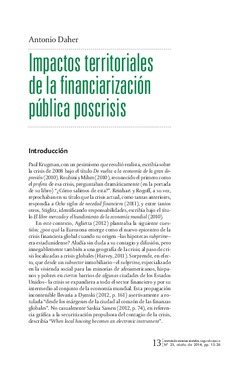Impactos territoriales de la financiarización pública poscrisis

Ver/
Fecha
2014-03Autor
Daher, AntonioResumen
Las políticas poscrisis de austeridad fiscal, servicio de deuda y competitividad, involucran alta movilidad geográfica de capitales y redistribución social y territorial de riqueza, estatizando y socializando muchos costos de la crisis, o externalizándolos a naciones emergentes, contagiándoles sus efectos. Tales políticas –preferentemente monetarias, fiscales y cambiarias– representan una auténtica reacción de financiarización pública de organismos estatales y supranacionales. Sus subproductos socioterritoriales prefiguran una nueva geografía de diferenciales de tasas de interés y reorientación de capitales; de paridades cambiarias, trastocando competitividad entre regiones y naciones; de deudas soberanas, del riesgo-país, riesgos sub y supranacionales, y del contagio de crisis; y de la producción, desindustrialización y reindustrialización. Además, se plantea una nueva geografía de los mercados de trabajo, cesantías y depreciación salarial; de pérdida de beneficios y seguros sociales; y de nuevas pobrezas en el mundo desarrollado y en desarrollo. The post-crisis policies of fiscal austerity, debt service and competitiveness involve a pronounced geographical mobility of capital, and the social and territorial redistribution of wealth. Such policies end up socializing and making public many of the costs associated with the crisis, and/or externalizing these costs to emerging nations, thus infecting them with negative effects. These policies (mainly monetary, fiscal and foreign exchange policies) represent a reaction by state and supranational organisms by means of an authentic public financialization process. The socio territorial sub products of these policies foreshadow a new geography based on interest rate differentials and the reorientation of capital; on foreign exchange parity, which disrupts competitiveness between regions and nations; on sovereign debts based on country-risk, sub and supra-national risks, and infection by the crisis; on production, de-industrialization and reindustrialization. Other issues include a new geography of job markets, unemployment and salary depreciation; of the loss of benefits and social security; and of new poverty in both the developed and developing countries of the world.
